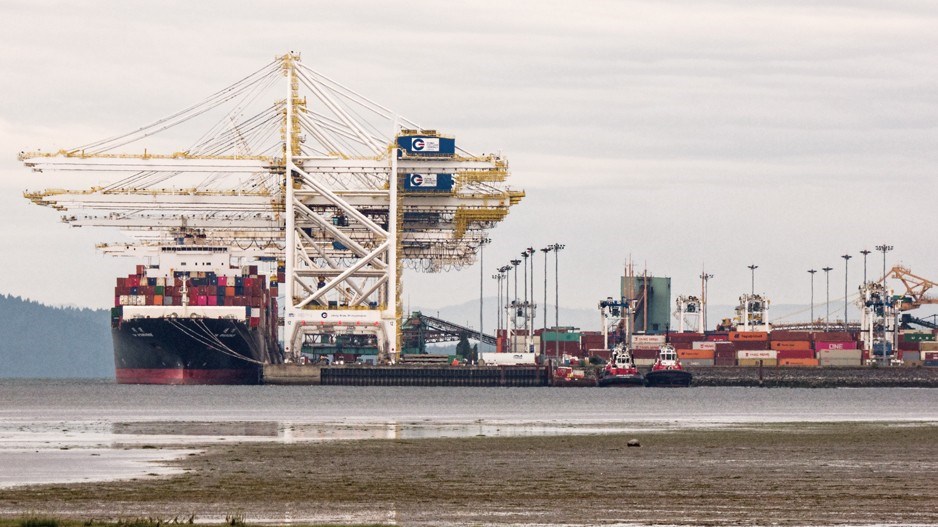While the rancorous debate over the multibillion-dollar proposal to build a new container port terminal at Roberts Bank continues, politics threatens to throw a wrench into the entire process.
Everyone involved in the Terminal 2 debate – including main proponent Vancouver Fraser Port Authority (VFPA), and opponents like local community and environmental groups and the operator of the current terminal at Roberts Bank, which is proposing its own expansion project – is keeping an eye on a potential federal election later this year.
The decision on Terminal 2’s environmental assessment decision may be forwarded from the federal Ministry of Environment and Climate Change to the federal cabinet for a final decision, so the outcome of a federal election could have a major impact on the terminal proposal.
A new post-election cabinet could shift the odds on the controversial project’s approval, said Terminal 2 opponent Roger Emsley.
“Yes, I am concerned, primarily because there are so many unknowns,” said Emsley, executive director of the Against Port Expansion community group. “I believe the odds of T2 being approved are stronger with a Conservative government, but I am not sure how the Liberals will behave if they get a majority.”
The uncertainties noted by Emsley stretch beyond the question of which party will win the election. For instance, Ottawa operates under pandemic procedures that, critics noted, allow the governing party to act more unilaterally in Parliament than usual. If those temporary rules are still in place for the Terminal 2 decision, Emsley fears that whoever wins the election can “get away with a lot” that wouldn’t happen normally.
He is also concerned about the Conservatives’ track record under former prime minister Stephen Harper on reducing environmental protections and regulations – although the Metro Vancouver resident also noted that Prime Minister Justin Trudeau’s Liberal government has been inconsistent in its environmental message when it comes to major projects.
Under another minority government, would the NDP or Bloc Quebecois hold the balance of power and wield policy influence on the Terminal 2 project?
“Overall, I believe there is a better chance of [Terminal 2] being turned down if the decision is made prior to an election,” he said. “But that is also why I believe the Liberals will call an election prior to making a decision, because they are uncertain how it will impact voter viewpoints – especially out west – and the election outcome either way.”
Duncan Wilson, the VFPA’s vice-president of environment, community and government affairs, said the port authority has responded to Ottawa’s August 2020 request for more information on Terminal 2 mitigation measures that may be implemented to address environmental and community concerns that emerged from an environmental assessment panel report.
“Hopefully, we will complete the information request submission by the end of summer. There will be a public comment period this fall, followed by a decision on the project,” Wilson said.
He added that a federal election could affect the timing of the Terminal 2 process, “but we would be seeing a decision out of government either later this fall or very early next year.”
Regardless of the election result, however, Wilson said he is confident the port authority will make a sound case. He noted the project’s plan now includes a proposal to set aside 87 hectares of habitat for wildlife affected by the terminal’s construction – an area equivalent in size to 163 football fields.
Wilson added that the VFPA has had talks with the Impact Assessment Agency of Canada (IAAC) as part of a preliminary exploration of potential conditions for project approval.
“I think it has been positive, largely,” Wilson said of the reaction from officials and community members. “A lot of the mitigation projects are informed by Indigenous recommendations.… We are confident that we will fully satisfy the information request [from Ottawa], and government will be able to move forward with a decision.”
Another key opponent to the Terminal 2 project, however, disagrees.
Global Container Terminals Canada (GCT Canada) operates the existing GCT Deltaport container terminal at Roberts Bank. GCT officials have been pushing the company’s Berth 4 expansion to Deltaport (DP4) as a less environmentally intrusive alternative to expanding the Port of Vancouver’s container capacity to handle the anticipated boom in transpacific cargo movement over the next 10 years.
Marko Dekovic, GCT’s vice-president of public affairs, said even if Terminal 2 clears its environmental assessment based on the port authority’s new information, the VFPA’s larger, more expensive project still has several hurdles to clear.
“That’s why GCT will continue advancing DP4,” Dekovic said. “For T2 to happen, the government has to approve the borrowing limit increase to the port authority so they can go find somebody to build the terminal for them. Even if they get that limit approval and find someone to build it, they still need to find somebody to pay for it. And they still need a terminal operator.”
In the meantime, DP4 has received IAAC approval for its initial project description and has completed one round of public comments.
Dekovic remains confident that Ottawa and other stakeholders will see GCT’s project – rather than the port authority’s Terminal 2 – as the right choice.
That, again, is where the upcoming election may play a role in raising the uncertainty over Roberts Bank’s future expansion, because different political players will see all the moving parts – Terminal 2, DP4, local opposition and industry input – and come up with different solutions.
For GCT, Dekovic acknowledged it’s a potential issue, although he declined to wade too deep into the political possibilities.
“That is a hypothetical question,” he said of an election’s potential impact. “What we are doing is advancing our project through the environmental assessment process that is done by the officials at the regulatory agencies. So we feel that’s hopefully not going to be impacted by the elections.” •




